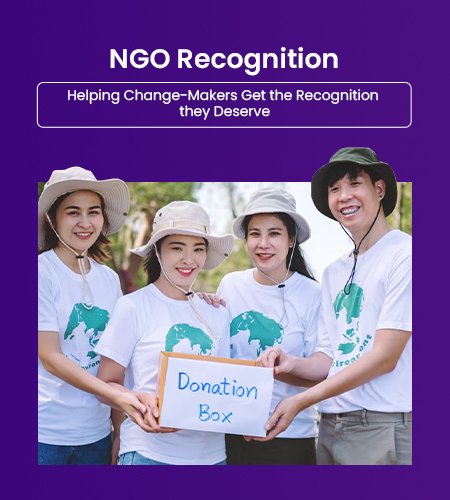
NGO Recognition
- Get legal status for NGO operations
- Operate transparently under Companies Act
- Limited liability for members ensured
- Ideal for structured fundraising approach
- Build credibility for corporate partnerships
- Ideal for charitable and cultural initiatives
- Operates under defined legal frameworks
- Collective decision-making with flexible structure
- Limited liability for governing members
- Suitable for grants and social projects
- Avail tax exemption on income
- Mandatory for donor tax benefits
- Essential for financial transparency
- Enables long-term financial planning
- Foundation for 80G approval
- Allow donors income tax deductions
- Increase fundraising potential drastically
- Boost donor confidence and credibility
- Required for CSR and donations
- Required for CSR and donations
NGO Registration in India
NGO Recognition
Explore the different types of NGO structures available for registration in India
and their respective advantages and disadvantages.
Section 8 (Not-for-Profit) Company Registration
A Section 8 Company is a not-for-profit company registered under the Companies Act, 2013, with the objective of promoting charitable activities such as education, arts, science, social welfare, environment protection, or religion. It is regulated by the Ministry of Corporate Affairs (MCA) and enjoys privileges similar to other companies, including a separate legal entity, limited liability, and perpetual succession. Profits or income cannot be distributed to its members; they must be reinvested into furthering the organization's objectives. Section 8 Companies must obtain a license from the Central Government (via ROC) to operate. They are highly regarded for transparency, legal structure, and ease in obtaining tax exemptions like 12A and 80G.
Advantages
-
Separate Legal EntityOperates independently of its members and directors.
-
Limited LiabilityMembers' personal assets are not at risk.
-
Credibility & TrustHighly preferred by donors, grant agencies, and government.
-
Tax Benefits EligibilityEligible for 12A and 80G registrations.
-
Perpetual SuccessionContinues regardless of change in management.
-
Easy Foreign Funding AccessEligible to apply for FCRA after 3 years.
-
Recognized under Companies ActEnsures strong governance framework.
Disadvantages
-
More ComplianceNeeds to file annual returns and conduct board meetings.
-
Government ScrutinySubject to detailed ROC and tax scrutiny.
-
Complex RegistrationRequires central government license and longer processing time.
-
No Profit DistributionCannot distribute profits among members or promoters.
-
Higher Professional CostSetup and compliance require professional assistance.
-
Requires Board CompositionMinimum 2 directors for private, 3 for public.
-
Limited Use of SurplusProfits must be strictly used for stated objectives.
Trust Registration (Public Charitable Trust)
A Trust is a legal arrangement in which a person (the settlor) transfers property to trustees for the benefit of beneficiaries, typically for charitable or religious purposes. Public charitable trusts in India are governed by state-specific Trust Acts (e.g., Bombay Public Trusts Act), or the Indian Trusts Act, 1882 in states where no separate act exists. It requires at least two trustees and a registered trust deed outlining the purpose and governance. Though simpler to register than Section 8 Companies, trusts are less strictly regulated and hence more flexible but less structured. Trusts can also apply for 12A and 80G exemptions under the Income Tax Act for tax and donor benefits.
Advantages
-
Simple RegistrationRegistration process is relatively straightforward.
-
No Capital RequirementCan be established with nominal assets or property.
-
Eligibility for Tax BenefitsCan register under 12A and 80G.
-
Ideal for Family/Religious CharitiesBest for close-knit or legacy giving.
-
Low Operational CostCheaper to maintain compared to Section 8 Companies.
-
Flexible StructureGovernance terms can be defined in the trust deed.
-
No Annual ROC FilingMinimal government reporting required.
Disadvantages
-
No Central RegulationGoverned by different state laws, causing inconsistency.
-
Less CredibilityLess transparency than Section 8 Companies.
-
Lack of Legal EntityNot considered a separate legal entity.
-
No Direct Foreign Funding AccessCannot apply for FCRA before 3 years.
-
No Limited LiabilityTrustees may be personally liable in some cases.
-
Change in Trustees is ComplicatedNo easy exit or addition of trustees.
-
Disputes Go to Civil CourtSlower legal resolution compared to Company Law.
Society Registration
A Society is an association of individuals who come together for a common charitable, literary, scientific, or social cause. Societies in India are governed by the Societies Registration Act, 1860, and corresponding state-specific amendments. To register a society, a minimum of 7 members (in some states, up to 9) is required, along with a Memorandum of Association (MOA) and rules and regulations. Societies are ideal for NGOs that wish to have a democratic setup and collaborative decision-making. They can operate across states if registered as an all-India society. Like trusts and Section 8 companies, societies can apply for 12A and 80G for tax benefits.
Advantages
-
Democratic StructureManaged by an elected Governing Body.
-
Easy to FormSimple registration process with local Registrar of Societies.
-
Tax Benefits EligibleCan apply for 12A and 80G exemptions.
-
Low Compliance CostMinimal annual filing compared to Section 8 Companies.
-
Ideal for Grassroots NGOsPopular among educational and community groups.
-
Can Operate NationallyCan be registered for pan-India presence.
-
Flexible GovernanceBylaws can be tailored as per the society's objectives.
Disadvantages
-
No Separate Legal EntityNot legally distinct from its members.
-
High Minimum Members RequiredRequires 7-9 founding members.
-
State-Specific LawsGovernance varies across states.
-
Less Professional ImagePerceived as less formal than companies.
-
Amendment Process is TediousChanging MOA or governing members is complex.
-
No Limited LiabilityMembers may be held liable in some cases.
-
No ROC RegistrationFewer protections under corporate law.
Registration under Section 12A of Income Tax Act, 1961
Section 12A registration is mandatory for NGOs (trusts, societies, or Section 8 companies) to claim income tax exemption on surplus income. Introduced under the Income Tax Act, 1961, it allows eligible institutions to operate without paying income tax on donations or other income used for charitable purposes. NGOs must apply for this registration via the Income Tax portal and submit documents including audited financials, registration certificate, and governing documents. After registration, the organization receives a unique 12A certificate which remains valid as long as the NGO complies with filing and operational conditions. Without 12A, donations received by the NGO are fully taxable.
Advantages
-
Income Tax ExemptionNGO income used for charity is fully tax-free.
-
Eligibility for CSR & Donor FundingOften mandatory for large grants.
-
Applies to All NGO TypesTrusts, societies, Section 8 companies all eligible.
-
One-Time RegistrationValid for a lifetime (unless revoked).
-
Mandatory for 80GA prerequisite for getting 80G approval.
-
Helps in Donor ConfidenceSignals legitimate and compliant operations.
-
No Tax on Corpus DonationsSpecific donations earmarked for corpus are tax-free.
Disadvantages
-
Application ScrutinyDetailed documentation and audits are required.
-
Renewal NeededProvisional 12A registrations must be renewed.
-
Can Be CancelledNon-compliance can lead to withdrawal of exemption.
-
Digital FilingOnly online application via income tax portal is accepted.
-
Processing TimeGranting of certificate may take 1-3 months.
-
Requires Professional SupportLegal or CA support often needed.
-
Post-Registration ComplianceAnnual returns and audits are compulsory.
Registration under Section 80G of Income Tax Act, 1961
Section 80G registration enables donors to claim tax deductions on donations made to registered NGOs. Under the Income Tax Act, 1961, this is a key incentive to attract donations for charitable causes. Only NGOs with valid 12A registration are eligible to apply for 80G. Once granted, the NGO receives a certificate and a unique registration number which must be included on donor receipts. Donors can then deduct 50% (or in some cases 100%) of the donated amount from their taxable income. The 80G registration is processed by the Income Tax Department and needs to be renewed periodically under the new online compliance regime.
Advantages
-
Donor Tax BenefitDonors can deduct 50% or 100% of donation from taxable income.
-
Attracts High-Value DonorsCorporates and individuals prefer 80G-eligible NGOs.
-
Government RecognizedAdds legitimacy to fundraising activities.
-
Applicable to All NGO TypesTrusts, societies, and Section 8 companies can apply.
-
Supports CSR and Grant ApplicationsOften required by donors or CSR partners.
-
Enhances CredibilityShows that the organization is tax-compliant.
-
Digital ProcessApplication and approval are now fully online.
Disadvantages
-
Requires 12A FirstCannot apply for 80G without valid 12A registration.
-
Frequent RenewalValidity is not perpetual; regular renewals required.
-
Detailed DocumentationStrict scrutiny of financials and activities.
-
Can Be WithdrawnViolations or non-use of funds can lead to cancellation.
-
Disclosure RequirementsNGOs must issue receipts with donation details.
-
Administrative BurdenAdds additional tracking and recordkeeping tasks.
-
Not Available for Religious NGOsOnly charitable organizations are eligible.
© ROKADH FINANCIAL SERVICES PRIVATE LIMITED

